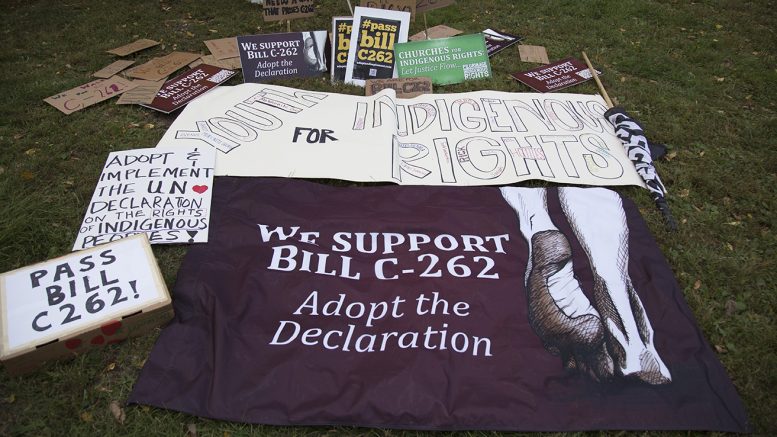More than 150 people embarked on a 12-kilometre walk from Stephen Juba Park to the U of M’s National Centre for Truth and Reconciliation (NCTR) Saturday to urge the federal government to adopt a private member’s bill entrenching the United Nations Declaration on the Rights of Indigenous Peoples (UNDRIP) into Canadian law.
Bill C-262, introduced by Québec NDP MP Romeo Sanganash in April, seeks to align Canadian law with the principles of UNDRIP. The bill is scheduled to have its second reading on Oct. 18.
The Truth and Reconciliation Commission (TRC), which investigated the legacy of Canada’s residential school system, issued a report with 94 calls to action in 2015. The TRC said answering these calls will move Canada towards reconciliation and build meaningful relationships between Indigenous and non-Indigenous Canadians.
Recommendation 43 urges all levels of government to “fully adopt and implement” UNDRIP, providing a framework for governments to protect the rights of Indigenous peoples and work towards reconciliation.
Ry Moran, director of the NCTR, addressed the crowd gathered at the NCTR, saying the principles of UNDRIP are central to reconciliation between Canada and its Indigenous populations.
“That is the essential part of this entire journey of reconciliation – that we don’t ever forget the gross and extreme violation of Indigenous rights that has happened in this country, for the entire existence of this country,” he said.
Moran noted that the journey to reconciliation will take time, and requires people from all walks of life working together.
“For all the non-Indigenous brothers and sisters in the audience,” he said, “this is the time for allyship.”
Allyship, he said, involves acknowledging the right of Indigenous people to organize “themselves culturally, politically, and socially to end all forms of discrimination no matter where they occur.”
Shahina Siddiqui, president of Islamic Social Services Association Inc., also spoke at the event, highlighting the importance of a collective spirit of hope when addressing the discrimination faced by Indigenous peoples in Canada.
“I can’t imagine the pain and anguish that the Indigenous people of this land have suffered but today is a day of hope,” Siddiqui said.
“We have the same hopes,” she added. “And walking together, the path is so important, so necessary and we need to continue to do it.”
Laura Tyler, a community organizer, claimed reconciliation is not just a process that entails “making amends for past transgressions.” She said it is an ongoing process.
“It is not acceptable that we think it’s all in the past,” she said.
“We need to do a better job of doing proper community consultations, and I think we can all agree that UNDRIP is an important step in that direction,” she added.
Government failings
Leah Gazan, an Indigenous activist and instructor at the University of Winnipeg, highlighted the failings of the government when it comes to addressing the systemic discrimination faced by Indigenous Canadians.
She said the government of Canada is failing First Nations children on reserves by underfunding child welfare and healthcare services. Gazan said that if UNDRIP were applied, development on Indigenous territory would not go forward without the direct consent of affected populations.
Currently, the government of Canada has a set of 10 principles it follows in navigating its reconciliation with the Indigenous peoples of Canada, but Gazan said that does not go far enough.
“The 10 principles being offered currently by the Liberal government under Minister Jody Wilson -Raybould […] don’t protect our land rights, our rights to our land, our rights to our mother, our rights to our waters,” Gazan said.
“There is no reconciliation in the absence of justice.”
Walking instead of talking
Michael Redhead Champagne, founder and organizer of Meet Me at the Bell Tower, a regular community forum hosted at the corner of Selkirk Avenue and Powers Street, urged the audience to seize the window of opportunity – the time between now and Oct. 18 – to organize to make UNDRIP a reality in Canada.
“In Winnipeg, we have a lot of members of parliament that like to do a lot of [talking] when it comes to talking about reconciliation and rights for Indigenous people but it is time for them to stop talking and start signing some things into law,” he said.
Prime Minister Justin Trudeau addressed the United Nations General Assembly in New York on Sept. 21 and highlighted human rights abuses in Canada, owning its failure to address the struggles of Indigenous peoples.
“For far too long they have [said] the beautiful words even in places like the UN and have refused to back it up with action,” Champagne said.
Meet Me at the Bell Tower, in collaboration with various community organizations, hosted Moving Forward Together: A Reconciliation Bell Tower, on Friday evening before the march.
In a conversation with the Manitoban, Champagne said, “There are still some people today that talk about reconciliation as if it is some kind of price tag. That is not what we are pursuing here.”
“There are still too many boil water advisories,” he said.
“There are still too many children in child welfare and there are still too many indigenous women at risk of violence and it is not being addressed by Canada.”

